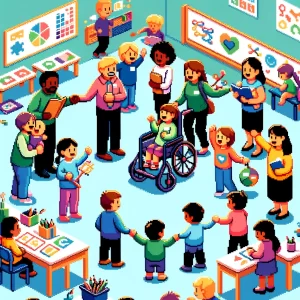
Parenting with Humor: Unlocking a New Tool for Resilient Kids
Parenting is no easy feat. As any parent, teacher, or mental health professional can attest, guiding children through life’s emotional rollercoasters is often as unpredictable as it is rewarding. And while we’re flooded with expert advice on structure, discipline, and emotional support, a surprising tool is gaining attention in the world of parenting research: humor.
At first glance, humor might seem like an unlikely candidate for a parenting tool—after all, isn’t parenting supposed to be serious business? But recent research is shedding light on the profound impact that humor can have on the well-being of both children and parents. In fact, the benefits go far beyond just lightening the mood—they include cognitive flexibility, emotional resilience, and even stronger family bonds.

Why Humor Matters in Parenting
Imagine this: You’ve had a long day at work, and your child is in full tantrum mode because dinner isn’t their favorite meal. Every attempt you make to calm them down seems to backfire. Frustration builds, and tension is at an all-time high. Now, what if instead of escalating the situation or enforcing stern discipline, you decided to join in the tantrum theatrically? You throw yourself dramatically onto the floor, mimicking your child’s wails. What happens next?
Most likely, your child will stop, bewildered, and start giggling. The intense emotions are disrupted, and suddenly, you both have a chance to reset. This is the power of humor—its ability to interrupt a negative emotional spiral and create an opportunity for connection.
The Research Behind Humor and Resilience
A recent pilot study conducted by researchers explored how humor can serve as a parenting tool and its potential benefits for both parents and children. The study surveyed 320 participants, asking them to reflect on their own experiences with humor growing up and whether they believed humor could be a helpful strategy for raising children. An overwhelming 71.8% of respondents agreed that humor could be an effective parenting tool, and 69.7% expressed interest in learning how to better use humor in their parenting approach.
What’s fascinating about these findings is the link between humor and cognitive flexibility—a mental agility that allows us to shift perspectives, adapt to new situations, and recover from setbacks. In children, this kind of flexibility is essential for emotional resilience, which is crucial for handling life’s inevitable ups and downs. Humor provides an avenue for children to see things from a new angle, helping them learn to cope with frustration, disappointment, or conflict in a healthy, creative way.

Using Humor to Build Stronger Connections
Humor doesn’t just help in moments of frustration; it also strengthens relationships. According to the study, participants who reported having a good relationship with their parents were more likely to recall humor being used during their upbringing. Those same individuals were also more inclined to use humor when parenting their own children. This correlation highlights an important truth: shared laughter fosters connection.
Think about the role humor plays in friendships or romantic relationships—it’s a bonding tool. The same principle applies in parent-child relationships. Humor can turn mundane or difficult moments into opportunities for connection, whether it’s telling a silly joke to ease tension before bedtime or making light of a mistake to show that it’s okay not to be perfect.

When Humor Goes Wrong: A Word of Caution
While humor can be a powerful parenting tool, it’s important to recognize that not all forms of humor are created equal. The same study revealed that humor styles—such as sarcasm or mockery—can sometimes backfire, especially when used inappropriately with children. These styles may inadvertently undermine a child’s self-esteem or cause confusion, particularly for younger children who might not yet understand the nuances of sarcastic jokes.
Affiliative humor, which focuses on inclusion and shared laughter, and self-enhancing humor, which helps people see the lighter side of challenges, are the most beneficial for building a positive emotional environment. On the other hand, aggressive humor (like teasing or mocking) and self-defeating humor (making fun of oneself in a harmful way) should be used sparingly, if at all.
Practical Tips for Parents and Educators
So, how can you incorporate humor into your parenting or educational approach without stepping into risky territory? :\
- Start Small and Playful: Try incorporating humor in everyday interactions. Play games that encourage creative thinking, like improvising silly stories or mimicking each other’s facial expressions. These playful moments can help children develop cognitive flexibility and learn to navigate emotions with ease.
- Use Humor to Defuse Tension: In stressful moments, humor can act as a reset button. Refram frustrating situations with a lighthearted comment. For instance, if they spill juice, instead of scolding them, you might say, “Well, I guess the floor was thirsty!” A little levity can go a long way in easing tension.
- Model Resilience Through Laughter: Show your children that it’s okay to laugh at mistakes. This teaches them that failure isn’t something to fear—it’s a natural part of learning. For example, if you burn dinner, you can joke, “Looks like I just invented a new flavor—‘crispy surprise’!” By modeling this kind of self-enhancing humor, you demonstrate resilience and adaptability.
- Create Shared Humor Rituals: Establishing regular moments of shared humor, such as “joke of the day” at breakfast or a silly dance party after school, can build a stronger emotional connection. These rituals offer children a safe, supportive space to relax and feel more comfortable expressing themselves.
Moving Forward: The Role of Mental Health Professionals
For school counselors and mental health professionals, incorporating humor into interventions can be a valuable tool for building rapport with students and encouraging emotional resilience. Group therapy sessions or social skills groups that incorporate playful activities can help students develop the flexibility to navigate peer relationships and cope with stress in a healthier way.
Additionally, as more research explores the benefits of humor in child development, educators and mental health professionals should be equipped with strategies to help parents harness humor in positive ways. Programs or workshops that teach parents how to effectively use humor in their daily routines could become a valuable part of mental health support services in schools and communities.
Final Thoughts: Laughter as a Lifelong Skill

Humor isn’t just a way to pass the time—it’s a tool for survival, connection, and growth. As this study suggests, humor can help children develop the cognitive and emotional skills needed to navigate life’s challenges. For parents and educators, learning to wield humor effectively might just be the key to raising resilient, flexible, and emotionally healthy children.
What role does humor play in your family’s daily life? Do you think humor can help children develop emotional resilience? Let’s talk about it in the comments!
Unlock Exclusive Educational Insights!
For just $50 a year, immerse yourself in the leading edge of school psychology. This Week in School Psychology brings you closer to the latest developments and applications in mental health education. Your subscription not only enlightens you but supports a wider movement towards informed impactful education. Sign up today and gain access to a world of exclusive content and community!



